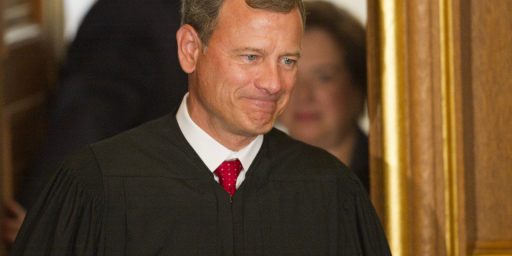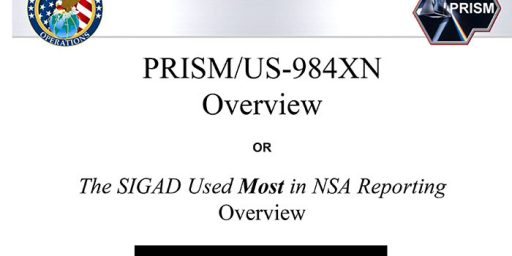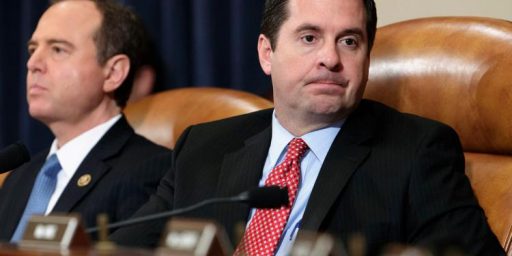Bush Allowed Warrantless Phone Surveillance After 9/11
The New York Times reports, over national security objections by the administration, illegally leaked information by officials of the National Security Agency that President Bush authorized warrantless domestic spying in the aftermath of the 9/11 attacks.
Bush Lets U.S. Spy on Callers Without Courts
Months after the Sept. 11 attacks, President Bush secretly authorized the National Security Agency to eavesdrop on Americans and others inside the United States to search for evidence of terrorist activity without the court-approved warrants ordinarily required for domestic spying, according to government officials. Under a presidential order signed in 2002, the intelligence agency has monitored the international telephone calls and international e-mail messages of hundreds, perhaps thousands, of people inside the United States without warrants over the past three years in an effort to track possible “dirty numbers” linked to Al Qaeda, the officials said. The agency, they said, still seeks warrants to monitor entirely domestic communications.
The previously undisclosed decision to permit some eavesdropping inside the country without court approval was a major shift in American intelligence-gathering practices, particularly for the National Security Agency, whose mission is to spy on communications abroad. As a result, some officials familiar with the continuing operation have questioned whether the surveillance has stretched, if not crossed, constitutional limits on legal searches. “This is really a sea change,” said a former senior official who specializes in national security law. “It’s almost a mainstay of this country that the N.S.A. only does foreign searches.”
Nearly a dozen current and former officials, who were granted anonymity because of the classified nature of the program, discussed it with reporters for The New York Times because of their concerns about the operation’s legality and oversight. According to those officials and others, reservations about aspects of the program have also been expressed by Senator John D. Rockefeller IV, the West Virginia Democrat who is the vice chairman of the Senate Intelligence Committee, and a judge presiding over a secret court that oversees intelligence matters. Some of the questions about the agency’s new powers led the administration to temporarily suspend the operation last year and impose more restrictions, the officials said.
The Bush administration views the operation as necessary so that the agency can move quickly to monitor communications that may disclose threats to the United States, the officials said. Defenders of the program say it has been a critical tool in helping disrupt terrorist plots and prevent attacks inside the United States.
Administration officials are confident that existing safeguards are sufficient to protect the privacy and civil liberties of Americans, the officials say. In some cases, they said, the Justice Department eventually seeks warrants if it wants to expand the eavesdropping to include communications confined within the United States. The officials said the administration had briefed Congressional leaders about the program and notified the judge in charge of the Foreign Intelligence Surveillance Court, the secret Washington court that deals with national security issues.
The White House asked The New York Times not to publish this article, arguing that it could jeopardize continuing investigations and alert would-be terrorists that they might be under scrutiny. After meeting with senior administration officials to hear their concerns, the newspaper delayed publication for a year to conduct additional reporting. Some information that administration officials argued could be useful to terrorists has been omitted.
While leaking classified information to the press is illegal and the perpetrators should be prosecuted, it is not readily apparent to me how the NYT’s publication of this report damages national security. I’m surprised and pleased that the paper actually waited a full year in consideration of these concerns.
As to the searches themselves, there’s not enough information here to cause a red flag to go up. Presumably, the NSA doesn’t have the time or inclination to eavesdrop on random Americans, preferring instead to concentrate their efforts on those whom they reasonably believe are tied to terrorists.
It also appears that reasonably stringent safeguards were put into the process. In addition to keeping the relevant congressional committees in the loop–a good indication that the administration was being above board–the targetting seems tightly focused:
What the agency calls a “special collection program” began soon after the Sept. 11 attacks, as it looked for new tools to attack terrorism. The program accelerated in early 2002 after the Central Intelligence Agency started capturing top Qaeda operatives overseas, including Abu Zubaydah, who was arrested in Pakistan in March 2002. The C.I.A. seized the terrorists’ computers, cellphones and personal phone directories, said the officials familiar with the program. The N.S.A. surveillance was intended to exploit those numbers and addresses as quickly as possible, they said. In addition to eavesdropping on those numbers and reading e-mail messages to and from the Qaeda figures, the N.S.A. began monitoring others linked to them, creating an expanding chain. While most of the numbers and addresses were overseas, hundreds were in the United States, the officials said.
Under the agency’s longstanding rules, the N.S.A. can target for interception phone calls or e-mail messages on foreign soil, even if the recipients of those communications are in the United States. Usually, though, the government can only target phones and e-mail messages in the United States by first obtaining a court order from the Foreign Intelligence Surveillance Court, which holds its closed sessions at the Justice Department.
Traditionally, the F.B.I., not the N.S.A., seeks such warrants and conducts most domestic eavesdropping. Until the new program began, the N.S.A. typically limited its domestic surveillance to foreign embassies and missions in Washington, New York and other cities, and obtained court orders to do so. Since 2002, the agency has been conducting some warrantless eavesdropping on people in the United States who are linked, even if indirectly, to suspected terrorists through the chain of phone numbers and e-mail addresses, according to several officials who know of the operation. Under the special program, the agency monitors their international communications, the officials said. The agency, for example, can target phone calls from someone in New York to someone in Afghanistan.
Warrants are still required for eavesdropping on entirely domestic-to-domestic communications, those officials say, meaning that calls from that New Yorker to someone in California could not be monitored without first going to the Federal Intelligence Surveillance Court.
To the extent that these searches are “unconstitutional,” the remedy is the Exclusionary Rule. That is, evidence obtained in this manner is inadmissable in a court of law. So, by gathering the information without a warrant, the government gains information that may or may not be helpful in defeating the terrorists but gives up the ability to go after those found using the legal system. That may well be a trade-off worth making.
Update: As one might expect, there has been a surge of reaction to this around the blogosphere. Some particularly interesting ones:
Michelle Malkin notes that the NYT has a conflict of interest here because James Risen has a book coming out that deals with the larger topic. More importantly, she believes they downplayed the significant gains of the program:
As a result of the NSA program, buried down in the 11th paragraph, we learn that the terrorist plot involving convicted al Qaeda operative Iyman Faris was uncovered–possibly saving untold lives, not to mention New York bridges and possibly Washington, D.C. trains.
She provides substantial background information on Faris and how huge this catch was.
Norbizness is outraged at both the Bush practice and those who defend it:
There’s only one way to scare the craven apologists in Category II: remind them of the very real possibility of a Hillary Clinton presidency in 2008 with unlimited powers against perceived terrorists, foreign and domestic. You mean you believed that all of those executive orders magically expire when your anointed security sock-puppet exits the White House as the worst executive ever?
Jon Henke sounds the same refrain:
Naturally, many people will jump to defend the administration, pointing out that, you know, terrorists and evildoers and national security and what’re you, some kind of traitor who wants another 9/11? They’ll continue making that argument until, say, Hillary Clinton ascends to the White House and it occurs to them that, hey, maybe giving the Executive Branch near-unlimited power to reinterpret and/or flaunt the laws might not be such a great idea after all.
While I fully agree that the “think of the worst possible president ever” substitute is a useful conceptual exercise, it doesn’t necessarily vitiate this policy. So long as reasonable institutional and procedural safeguards are in place to ensure that the surveillance is directed only against legitimate terrorist subjects–and we have no evidence to the contrary here–the potentially huge gain in security may well be worth the seemingly minimal tradeoff in theoretical privacy. The fact that congressional oversight seems to be well in place here–at the administration’s own accord–makes me more comfortable in this regard.
Glenn Reynolds is dubious:
If this report is true, it really is a major shift in U.S. surveillance policy — though I’m not sure whether snooping on international calls that originate or end in the U.S. is such a big departure. […] I can’t see any very compelling reason to bypass the courts here, especially given that warrants in these cases are almost always granted. Which makes me wonder what’s up.
John Cole has similar concerns.
My guess–and it’s only that–is that this is explainable by several factors. It may well be that, given the nature of intelligence in general and terrorism in particular, that there are people about whom there is suspicion of terrorist ties but not sufficient probable cause to obtain a warrant. Or, perhaps, concern about revealing sources and methods to judges (although seemingly mitigated by post-9/11 laws) is a factor. Or time. In any case, as noted in the main post, the remedy against unreasonable warrantless searches is exclusion of that evidence–and any resultant evidence via the Fruit of the Poisonous Tree Doctrine–from admissibility in court.
Orin Kerr thinks this “big news” but withholds further judgment. He provides this helpful background, though:
While the statutory privacy laws have an exception for this type of monitoring, see 18 U.S.C. 2511(f), and the constitutional limits on e-mail surveillance are uncertain even in traditional criminal cases, the constitutionality of warrantless interception of telephone calls in situations like this is really murky stuff. To get up to speed on some of the issues, check out Judge Sand’s opinion in United States v. bin Laden, 126 F.Supp.2d 264 (S.D.N.Y. 2000). (.pdf)
John Hinderaker observes that, “The Valerie Plame case has established that any leak of classified information from an intelligence agency is a serious matter, regardless of how trivial the information may be, and must result in criminal investigation and prosecution” and contends the leak behind this story is far less “trivial.”
Phil Carter thinks the program itself is “huge news” but finds the administration’s non-publication request more interesting:
If the White House made that kind of request to the Times—and the Times acceded to it — then this program really had some juice. This isn’t just some developmental program (like Total Information Awareness was), or some basement program (like Able Danger) — this was/is probably a centerpiece of the federal government’s counter-terrorism efforts.
Quite probably. The request could be dismissed as just knee-jerk desire for secrecy on the administration’s part. That the NYT actually acceded to it–during a tight election campaign, no less–is indication that they took it seriously, though.
Update 2: via Malkin, I see that Mark Levin has a concise, plausible explanation:
The Foreign Intelligence Security Act permits the government to monitor foreign communications, even if they are with U.S. citizens — 50 USC 1801, et seq. A FISA warrant is only needed if the subject communications are wholly contained in the United States and involve a foreign power or an agent of a foreign power.
The reason the President probably had to sign an executive order is that the Justice Department office that processes FISA requests, the Office of Intelligence Policy and Review (OIPR), can take over 6 months to get a standard FISA request approved. It can become extremely bureaucratic, depending on who is handling the request. His executive order is not contrary to FISA if he believed, as he clearly did, that he needed to act quickly. The president has constitutional powers, too.
Presuming FISA in fact accorded him that discretion–as one would expect–that strikes me as plausible. Like me, he thinks the fact that Rockefeller knew about this long ago and has not raised a red flag publically is quite significant.
Update 3: The the opening paragraph of FISA [TITLE 50 > CHAPTER 36 > SUBCHAPTER I > § 1802] states:
(1) Notwithstanding any other law, the President, through the Attorney General, may authorize electronic surveillance without a court order under this subchapter to acquire foreign intelligence information for periods of up to one year if the Attorney General certifies in writing under oath that—
(A) the electronic surveillance is solely directed at—
(i) the acquisition of the contents of communications transmitted by means of communications used exclusively between or among foreign powers, as defined in section 1801 (a)(1), (2), or (3) of this title; or
(ii) the acquisition of technical intelligence, other than the spoken communications of individuals, from property or premises under the open and exclusive control of a foreign power, as defined in section 1801 (a)(1), (2), or (3) of this title;
According to the definitions in 1801:
(i) “United States person†means a citizen of the United States, an alien lawfully admitted for permanent residence (as defined in section 1101 (a)(20) of title 8), an unincorporated association a substantial number of members of which are citizens of the United States or aliens lawfully admitted for permanent residence, or a corporation which is incorporated in the United States, but does not include a corporation or an association which is a foreign power, as defined in subsection (a)(1), (2), or (3) of this section.
The NYT piece was pretty clear that the surveillance was not directed against “United States persons†under this definition:
Administration officials are confident that existing safeguards are sufficient to protect the privacy and civil liberties of Americans, the officials say. In some cases, they said, the Justice Department eventually seeks warrants if it wants to expand the eavesdropping to include communications confined within the United States. The officials said the administration had briefed Congressional leaders about the program and notified the judge in charge of the Foreign Intelligence Surveillance Court, the secret Washington court that deals with national security issues.
So, even in the view of those who felt this policy was so aggregious that they violated their sacred trust, warrants were obtained even in the case on non-“U.S. persons” in cases where the surveillance was exclusively domestic.
Update 4: Specter and McCain Call for Investigation of NSA Spying






Being one of those folks who used to be responsible for collecting intelligence for NSA, what I find most troubling is the potential for government intelligence collectors to violate the law, and subsequent indictment and prosecution.
When you’re in that business, the restrictions on collecting intelligence on “US persons” is drummed into your head on a regular basis, so you wouldn’t even be able to claim ignorance of the law, or “I thought it was legal,” or anything else along those lines.
I have long considered the FISA restrictions too tight, but it’s still the law, and if we need the authority to conduct these types of operations, we should change the law.
My concerns are somewhat assuaged by some of the legal opinions cited in the Times piece, but I would still be pretty uncomfortable acting as a government employee possibly in violation of the law. What would make things even tougher is the fact that I believe that the law is wrong.
Boyd: Fair points. I’d prefer to see the black letter law changed rather than have the president do things by executive order that violates the law, to be sure. I lack sufficient grounding in what the law is to know if that line has technically been crossed.
My tentative position, based on what I’ve read/heard so far, is that I don’t have any objection on public policy grounds to the level of spying described here. There may well be other issues that I haven’t considered, though.
The President doesn’t have to follow the law. He is above the law.
If one does not have anything to hide from the quest or inquiries to fight the war on terrorism, then one does not have anything to fear if the government does look into their past or present activities. It is far more important to have a little domestic “spying” that would prevent another 9/11 than to give the terrorists a wide open door to do it again.
And to those that just shot down the Patriot Act in the Senate, I ask each of them who voted the act down, If thay are ready to accept full responsibility if and/or when another 9/11 happens. Are each of them ready to be charged and prosecuted for their failure in office to protect every American who put their trust in them to perform their sworn duty and protect the US from all enemies, foreign and domestic who would destroy our country.
Trivia question: Who was it that said, of governance by executive order, “Stroke of the pen, law of the land. Pretty cool.”
From what I read in the NYT article, the Bush Administration believes the post-9/11 resolution authorizing a war footing against al Qaeda, permits this change. Whether that resolution can authorize this change is the real question WRT legality.
All in all, I think the 48-Hour Rule should probably be invoked on this. It just reeks of “not the whole story.”
And to think the Bushites complain about the “tyranny” of activist judges. At least judges operate in the light of day.
There’s a “reasonably stringent safeguard” already in the process.
It’s called a “warrant.”
Anjin:
Blow it in your ear. You are no doubt the most negative individual in the entire of America. You zero in on anything to prove or uphold your perveted points. Like I said before, your problem is you are “just another left coast liberal” that loves your famous hollywood whores and pimps as well as the infamous misfits in SF.
If the NYT sat on the story for a year, the elections were long over. I do my best not to fall into any sort of conspiracy theory, but the timing of this is almost too cute. Let’s all welcome the return of the Gorelick Wall.
Anderson: What about “State of War” do you not understand?
Matt: I admit the timing is rather close.
From the article:
It’s December 16, 2005. So, they’ve delayed it since December 16, 2004. The election was November 2, six weeks prior. Presumably, the time it took to set up and conduct the meeting with the administration and to make the decision took quite some time. Presumably, too, it took a while to do the first round of investigations. So, at a minimum, it’s quite likely the NYT was working on this story during the last days of the campaign.
Bithead: What about “Fourth Amendment” do you not understand? See the emergency clause? You don’t? Me either.
As Laura Rozen points out, getting a warrant is not exactly like jumping through a hoop of fire.
I used to have some respect for conservatives because I thought they were committed to some basic values. The kind of conservativism one saw in Scalia’s Hamdi opinion, for instance.
Conservatives were supposed to be the kind of people who intuitively understood that “states of emergency,” like Hitler relied upon in 1933, were classic excuses for tyranny.
No more, apparently. We have scarcely any conservatives left in the Republican Party. Just worshippers of executive power. Apparently you really can lose your soul and not even notice. Reagan and Goldwater are spinning in their graves, to say nothing of Burke.
Anderson:
You sound just like Anjin San.
Anderson: I don’t see any 4th Amendment issues here. Nobody’s houses are being entered. As best I can tell, this is about non-citizens who happen to be within the borders of the U.S. and are suspected of terrorism being monitored. If something is found, the evidence is worthless in court but can be used to stop the act of terrorism.
I agreed with Scalia in Hamdi. American citizens are entitled to full due process rights. Even non-citizens who aren’t enemy combatants are owed substantial due process. This is sheer information gathering.
As to warrants not being that difficult to get, that’s apparently not true from a procedural standpoint per Levin. We’ll learn more about that in coming days, I suspect.
Hell, I think airport searches of people for whom there is no probable cause is highly suspect on 4th Amendment grounds. I just don’t see a reason for fuss here, though. That may change as more info comes to light but, so far as I can tell, there are no outrageous cases.
Anderson: I don’t see any 4th Amendment issues here. Nobody’s houses are being entered.
Oh JJ, you did not just write that. Is Katz v. United States now an illegitimate misreading of the Constitution?
From page 104-105 of the 911 report:
>>
I may be reading more into this, but does it say that had the NSA been monitoring
conversations between US citizens (with known terrorist connections) and foreign
countries, that we could have avoided 911?
You misread the statute if you think FISA allows wiretapping of a conversation with either side emanating from the USA. (1)(A)(i) — unless either or both sides originate from foreign territory in the US, such as an embassy. subs. (ii).
The Executive does not need a warrant to surveil a conversation occurring entirely outside the USA, but does need one if either side is here.
Quite simply the President has committed a felony. The surprising thing is that there does not appear to have any need to have done so. The FISA court was created for the purpose of reviewing applications and granting warrants for surveillance, routinely grants them very quickly at any hour of the day or night, 24/7. The FISA court apparently requires a much lower threshold for probable cause than a regular federal court since of the tens of thousands of applications it has received in the 24 years of its existence it has only denied five — and of those five, three were granted when rewritten. The investigating agency, whether NSA, CIA, or FBI, or ?… may apply for a warrant 72 hours after it has already intercepted a communication. Furthermore, the FISA explicitly contemplates a war emergency and specifically allows investigating agencies up to 15 days retroactivity. Clearly the President has gone beyond that.
The question is why has he done so. Since there are no valid national security reasons, the explanation must lie elsewhere.
Finally, it must be noted that the President’s complaints about national security harm resulting from the NYTimes publication of the existence of the warrantless searches are baseless. One must assume that the terrorists assumed their communications were subject to surveillance whether or not they were alerted to the possibility of a warrant.